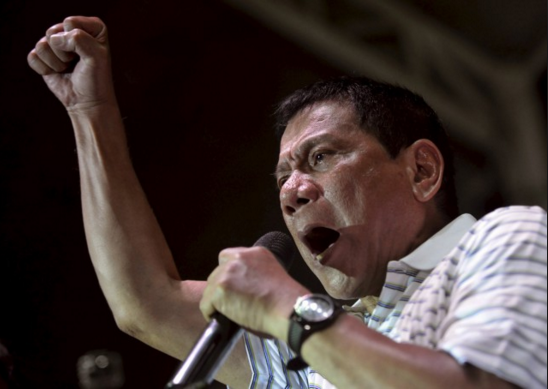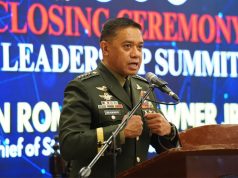
Before flying out to China, President Rodrigo Duterte said he will ensure Chief Justice Maria Lourdes Sereno is ousted.
Duterte’s statement was rare for a chief executive to make given the Constitution’s strict provisions on separation of the two branches of government.
Detained Sen. Leila de Lima did not take the president’s declaration of war siting down, calling it an “unacceptable behavior as a public official.”
Duterte’s declaration of war on the Chief Justice is unacceptable behavior for any public official. But this is Duterte, and we have been used to his gangster governance for some time now.
Read Statement on Duterte’s latest tirade vs CJ Sereno: https://t.co/KaYr9mdpbA pic.twitter.com/jZgx7SAYbS
— Leila de Lima (@SenLeiladeLima) April 10, 2018
Traditionally, presidents accused of politicizing or meddling in the two other branches of government were said to be violating the separation of powers enshrined in the Constitution.
The Supreme Court spokesperson in 2010 said then President Noynoy Aquino should be given a lecture on the separation of powers. In 2011, the court again criticized him for attacking then Chief Justice Renato Corona at a public forum.
“While it is the prerogative of the president to speak his mind, we find it quite disturbing,” the high court said then.
Duterte previously distanced himself—at least in public statements—from cases against Chief Justice Sereno. Recently, however, he appeared triggered by her accusation that he was behind the ouster efforts against her.
Instead of the expected denial, the president went all out and declared war.
Three branches, three separate powers
According to the 1987 Constitution, the government has three branches of government—the legislative, the executive, and the judicial department. These departments have three separate powers.
The executive branch implements the laws that are passed by Congress. The members of Congress make the laws and the judiciary branch evaluates the laws if they conform to the Constitution
Duterte and Sereno head two of the three branches of government, the executive branch and the judiciary branch, respectively.
Article XI Section 3 states that only Congress can handle impeachment cases. The House of Representatives shall have the exclusive power to initiate an impeachment case, whereas the Senate shall try and decide them.
The three branches of government allow a system of checks and balances so that no one branch can abuse its authority.
Blurred roles
Despite the impeachment provisions stated in the Constitution, the separation of powers of the three government branches seems blurred especially with a strong president who lays out political aims.
Casual observers share their theories, shared by many pundits.
We ndo not have to be a fan of de Lima or Sereno, to realize that Duterte is consolidating power over Judiciary by going after Sereno, over opposition in Congress by jailing de Lima. There are 3 co-equal branches in gov. and it has always been there for good reason.
— H D’ baroness (@ILoveSteak) April 10, 2018
“How long do we pretend that everything is normal, and that this country can still survive the damage this man has done to our institutions,” De Lima said in her statement.









